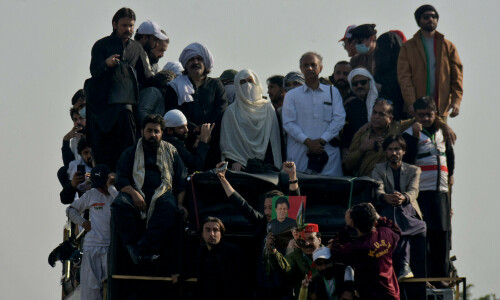 COLOMBO, July 31: The premiers of India and Pakistan will thrash out a plan this weekend to improve ties strained by clashes along LoC and bomb attacks on Indian targets, Pakistan’s foreign minister said on Thursday.
COLOMBO, July 31: The premiers of India and Pakistan will thrash out a plan this weekend to improve ties strained by clashes along LoC and bomb attacks on Indian targets, Pakistan’s foreign minister said on Thursday.
Shah Mahmood Qureshi told reporters that he and his Indian counterpart Pranab Mukherjee had agreed mutually that their prime ministers “will come out with a comprehensive statement on (future) bilateral engagement.”
Mr Qureshi was speaking after the pair met behind closed doors to lay the groundwork for Saturday’s talks between India’s Manmohan Singh and Pakistan’s Yousuf Raza Gilani on the sidelines of the Saarc summit in Colombo.
He said that his talks with Mr Mukherjee had helped “clear the air” between the two countries.
“A lot of steam had been let out of the pressure cooker. The dish we’re going to cook is going to be for the betterment of the region,” he said.
The talks between Mr Gilani and Mr Singh will mark the highest-level interaction between the two countries in 15 months.
Mr Mukherjee was more guarded in his comments, telling reporters separately that the ministers had shared “perceptions about bilateral relations, the composite dialogue (peace talks) and certain recent events.” He declined to elaborate about his meeting with Mr Qureshi, which lasted about an hour, sources close to the talks told AFP.
Escalating tensions between India and Pakistan had threatened to cast a shadow over the South Asian Association for Regional Cooperation summit aimed at improving regional economic growth and cooperation, which begins on Saturday.
Thursday’s meeting, the second between the two sides in a month, came after India said the peace process begun in 2004 was “under stress” after an attack on its Kabul embassy in early July killed at least 41 people.
Afghanistan blamed the suicide bombing on Pakistan, a claim denied by Islamabad.
India has accused “elements” in Pakistan of responsibility for the attack.
The latest talks came after a string of bomb blasts in India — in the western commercial hub of Ahmedabad and in the southern IT centre of Bangalore over the weekend that killed at least 50 people and injured scores more.
The talks also came amid a sudden rise in reported ceasefire violations along the Line of Control.
Earlier this week, India accused Pakistani troops of crossing the Line of Control in Kupwara sector, the first incursion reported by New Delhi since the 1999 Kargil war.
New Delhi also this week reported a second ceasefire violation in the Nowgam sector, north of Srinagar.
Pakistan has denied both incidents.
“Pakistan feels very strongly about upholding the ceasefire on the LoC. We adhere to such concepts. Now such minor incidents will be sorted out at flag meetings at military levels,” Mr Qureshi said.
The two countries agreed to a ceasefire along the LoC in 2003.
Before the truce, the two armies regularly exchanged heavy artillery, mortar and machine-gun fire across the Line of Control.
WAR ON TERROR: Mr Qureshi said that “minor incidents” should not overshadow Islamabad’s positive contribution to combating terrorism.
“Pakistan’s positive contributions should not be overlooked when minor incidents take place,” Mr Qureshi said when asked about US media reports that Islamabad was linked to a surge of violence across the border in Afghanistan.
“Pakistan has cooperated and will cooperate fully... When people point fingers at Pakistan, they must realize that Pakistan has apprehended 600 known terrorists,” Mr Qureshi said.
“Pakistan is a country which is cooperating with its partners and allies in the fight against extremism and terrorism.” He did not elaborate on the “minor incidents,” but said Pakistan was ready to investigate any allegations.
His remarks came after Pakistan’s military on Wednesday rejected a malicious report that a top CIA official visiting this month confronted Islamabad over ties between the country’s intelligence service and militants.
The New York Times said agency deputy director Stephen Kappes highlighted alleged ties between Inter-Services Intelligence (ISI) and those responsible for the surge of violence across the border in Afghanistan.
Citing anonymous defence and intelligence sources, the Times said the meeting focused on supposed intelligence links with Taliban commander Jalauddin Haqqani.
It said that earlier this year the US military pressed for Pakistani troops to hit the Haqqani network.—Agencies













































Dear visitor, the comments section is undergoing an overhaul and will return soon.